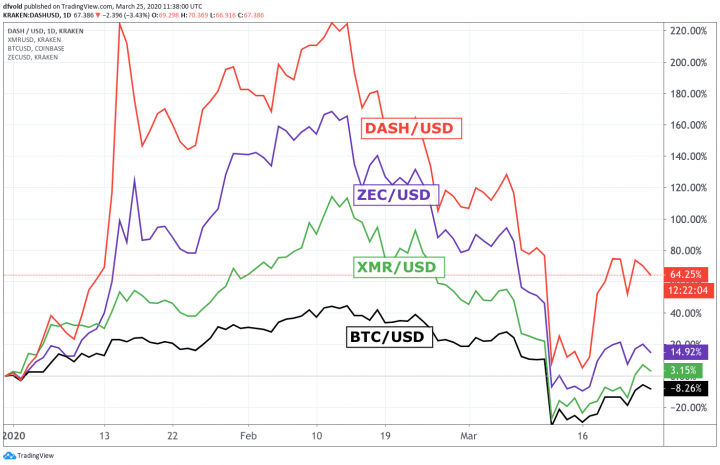
Bitcoin is great, but is it the safest option for Covid-19? We look at why Monero could be the superior cryptocurrency in this unprecedented situation
Health experts have speculated that the Coronavirus lockdown could last for up to six months, casting a shadow of uncertainty over finance, tax and government measures for the foreseeable future.
Some in the crypto community will be buying as much Bitcoin and crypto assets they possibly can as a hedge against a possible recession.
But what if your Bitcoin is not as safe as you think it is? Here are five reasons to start buying Monero now.
Monero outperforms Bitcoin since the beginning of 2020
When looking at percentage increases over the first four months of 2020, we can see that Monero, as well some of the other privacy coins, has outperformed Bitcoin – showing that transaction privacy is becoming more of a priority for those investing in cryptocurrencies.

The data also shows that since the cryptocurrency crash in mid-March, Monero has maintained its dominance over Bitcoin’s percentage increases, a trend that may continue and have huge significance over the longer term.
Bitcoin creator may also have invented Monero
New research has provided some compelling evidence that Satoshi Nakamoto was also the leading force behind Monero, a revelation that if true, could be transformative for the currency, legitimising and contextualising it as a significant player in the crypto space.
One of the criticisms of Bitcoin comes from one of the strengths underpinning it – the distributed ledger. Transactions can be traced, which although providing ‘trust’ can also be exploited by authorities who want to track wallet owners down. Although difficult, this is possible and is something that Satoshi may have wanted to fix in his second cryptocurrency project, the research claims.
The speculation comes from Monero’s whitepaper being written under a moniker, like Bitcoin’s – in this case the author was Monero Nicolas van Saberhagen. Writing analysis claims to have found a similarity in Saberhagen and Satoshi’s writing style, as well as Monero supposedly fixing some of the areas that Bitcoin fell short in that it was aiming to do in its white paper.
Monero continues to update despite the virus
Monero recently updated its Carbon Chameleon software, despite the current climate and circumstances.
The upgrade focuses mainly on transaction execution, as well as improving privacy protocols with Tor and the I2P network.
Monero provides a way to send money completely anonymously, and the continued upgrades will surely inspire even greater confidence for holders. As some governments around the world are bringing in more draconian and authoritative measures, such as Hungary, keeping your money safe and out of your government’s reach may not be the worst idea.
Monero is the cryptocurrency of choice for criminals
Although none of us condone the actions of criminals, the fact that this currency has been used in the past by those who wish to avoid the attention of certain authorities, does speak volumes on how successfully Monero maintains privacy.
This shows the currency’s privacy protocols must work; seeing authorities try and uncover the identities behind transactions is one of the best ways to test the technology.
A tweet by the notorious tech developer John McAfee shows he believes that criminal involvement is good for the coin’s development.
McAfee claims that historically, criminals are quicker to embrace new technologies than authorities, and that Monero is no exception, citing criminals adopting telephones quicker than the police did.
Wider adoption may be facilitated by those that want greater financial independence from the government and corporations.
Monero could bring Google and Facebook to an end
By now, we all have a basic understanding of how Google and Facebook make money, right?
They use cookies to track your purchases and then use the purchasing data to target ads at you. Well, imagine if all our purchases were made with Monero. They would be untraceable, bringing an end to targeted advertising, and forcing Google and Facebook to find new ways to monetise their services or risk collapsing completely.
Some argue of the difficulties governments would face in collecting tax and securing their revenue if we all used Monero, however, others would be quick to point out the vast tax evasion by the super-wealthy and the poetic justice that this would bring to ordinary people who have no choice when it comes to paying tax.
Whatever happens, Monero could have a part to play as this crisis unfolds and if traditional markets prove themselves an unsafe place to store wealth.

